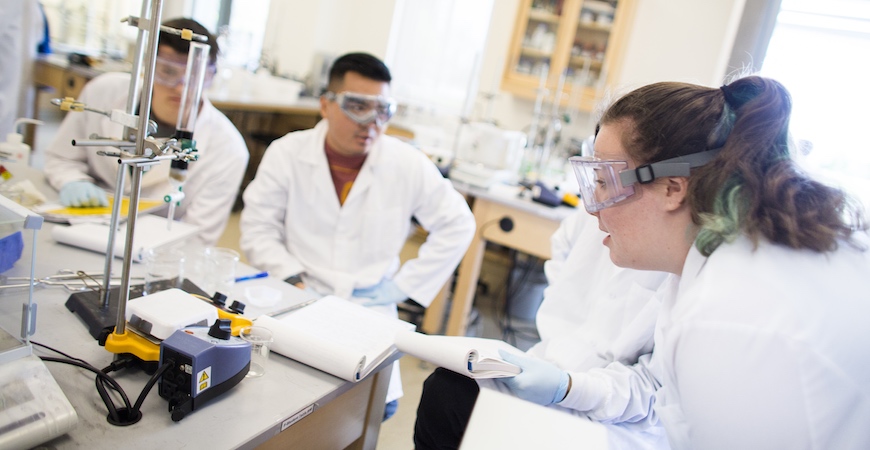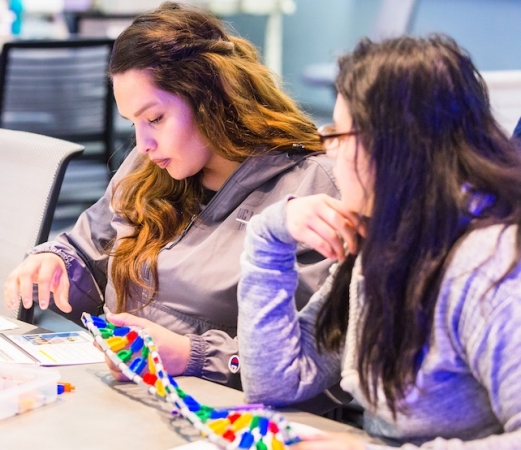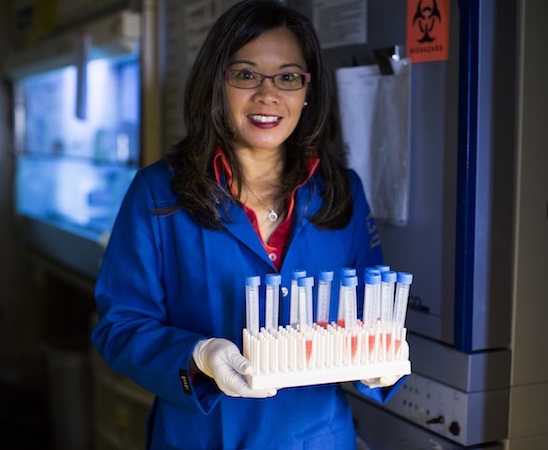
UC Merced’s efforts to make science education more inclusive were recently given a huge boost after the campus was awarded its first Howard Hughes Medical Institute (HHMI) grant, an impressive mark of distinction that reflects the strong upward trajectory of the campus’s research and teaching efforts.
One of 33 schools selected this year to join the HHMI Inclusive Excellence initiative, UC Merced will receive $1 million over the next five years to test a new undergraduate biological sciences curriculum — one that’s more inclusive of underrepresented and non-traditional students.
“This grant will help us implement faculty development programs, revise the laboratory curriculum and build student-faculty learning communities that promote inclusivity across the university,” said Jennifer Manilay, professor of biological sciences and program director on the new grant.
The UC Merced student body is 71 percent first-generation college students, 57 percent underrepresented minorities and 51 percent women. Many of these students begin their college careers studying biology — among the most popular majors on campus — but end up switching majors or leaving school before graduating.
Nineteen percent of intended biology majors transferred or withdrew from UC Merced and 22 percent switched majors by their seventh semester. Manilay says the new approach will improve retention rates and educational outcomes.

The revised curriculum will emphasize active classroom participation and inquiry-driven laboratories. This approach allows faculty to assess and respond to students in real time, in stark contrast to the professor-at-podium lectures and follow-the-recipe labs that dominate most undergraduate biology programs.
“There’s growing shifts toward active learning and recognizing the assets that students bring to the classroom,” said Dean of Natural Sciences Betsy Dumont, administrative lead on the grant. “Research has demonstrated that retention and graduation rates can be increased by making relatively simple changes in approaches to classroom teaching.”
New approaches include the “flipped classroom,” which biology faculty members like Michael Dawson, Marcos García-Ojeda and Kamal Dulai have already implemented and will continue to develop under the new grant. The “flipped” approach has students watch video lectures before coming to class so that classroom time is used for active discussion and participatory exercises that reinforce lectures and dive deeper into the material.
The approach also includes a revised lab curriculum centered around CURES — Course-based Undergraduate Research Experiences — that provide students with more realistic lab experiences. In traditional teaching labs students follow relatively rigid sets of instructions to achieve a predetermined result. Recent innovations in lab teaching promote a hypothesis-based, trial-and-error approach that drives discovery and, sometimes, unexpected results. CURES provide students with immersive lab experiences that are less prescribed and more reflective of real-world science.

Supporting faculty development is a key component of the grant. The new curriculum isn’t just targeted at biology students — it will also help faculty learn how to bring their own expertise and passion for research into their classrooms.
“Most faculty never received training in pedagogy,” Manilay said. “Teaching is not emphasized at the research institutions where most STEM faculty completed their doctorates.”
Because of the research-first approach that defines most STEM doctoral programs, many faculty aren’t familiar with current best practices in teaching. Many are even of the opinion that research and teaching are at odds with one another, a view that Dumont does not share.
“Excellence in teaching and research are not mutually exclusive," she said. "Both are about logical thinking and clear, compelling communication. This grant is about giving students, staff and faculty the tools and support they need to succeed in both of these realms.”
Measuring the success of the new approach are Associate Vice Provost for Teaching and Learning James Zimmerman and Student and Program Assessment Manager Amy Moffat. They’ll develop tools to assess instructor efficacy and determine whether students have met the new curriculum’s learning objectives. Therefore, this project will not only connect research in the biological sciences to the undergraduate curriculum, but could also contribute significantly to biology education research beyond UC Merced.
And biology faculty member Laura Beaster-Jones will lead an effort to bridge the cultural divide between biology faculty and underrepresented students. Surveys of students and faculty revealed that their goals and values were imperfectly aligned. The grant will help create social networks where faculty connect with students in small group settings to exchange ideas and perspectives.
“Our goal is to institute cultural change,” Manilay said. “Students and faculty who go through the new curriculum will improve learning outcomes. We’re hoping this becomes the way we do all of the sciences at UC Merced.”



